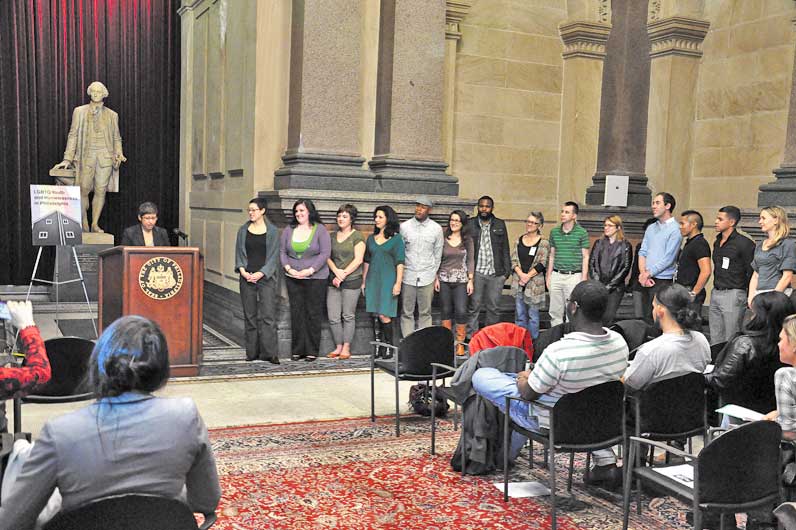Youth advocates came together this week at City Hall to draw attention to the epidemic of homelessness among LGBT young people.
For the first time ever, the city is formally recognizing November as Runaway and Homeless Youth Awareness Month, marking the occasion with a proclamation that was read Tuesday at City Hall by Gloria Casarez, the city’s director of LGBT affairs.
“National Homeless Youth Awareness Month provides an opportunity to shed light on the issues of youth homelessness and the challenges [the youth] face daily,” Casarez read. “Along with losing their home, their community, their friends and their routines, as well as a sense of stability, many homeless young people are victims of trauma. While trying to survive on the streets, youth are exposed to countless dangers with increasing likelihood of substance abuse, early parenthood or depression.”
These issues were examined through an LGBT lens at Tuesday’s briefing, hosted by the Housing Committee of Connect To Protect, a coalition of youth-serving agencies and advocates, organized by the Children’s Hospital of Philadelphia, who work on HIV-prevention efforts for young men who have sex with men.
According to C2P, LGBT youth are disproportionately affected by homelessness, with an estimated one in five Philadelphia homeless youth identifying as LGBT.
Last year, the National Runaway Switchboard fielded more than 1,000 calls from the Philadelphia area and, despite an estimated 6,500 homeless on the streets every night — an unknown number of whom are youth — the city only offers 14 crisis shelter beds for youth 17 and under who are not involved with the Department of Human Services, and there are only 45 beds available for those ages 18-21.
Alison Lin, C2P community coordinator, noted that ideally the coalition wants to see an increase in the number of shelter beds for youth not in the child-welfare system as well as in the availability of youth transitional housing.
Lin noted that the coalition is also focusing on a partnership with DHS to work on homelessness-prevention, especially for those aging out of care; currently, almost half of youth who were discharged from the child-welfare system lacked housing for up to six months.
Since its 2008 launch, the C2P Housing Committee and its affiliate supporters, including The Attic Youth Center, Mazzoni Center and Covenant House, have worked to put in place LGBT training for support staff at local shelters, instituted HIV testing at youth shelters and spearheaded clothing donations and laundry services, among other successes.
Awareness-building is a key component of preventing LGBT youth homelessness, the advocates at Tuesday’s briefing said, with C2P project director Marné Castillo challenging attendees to each inform at least three people about the plight of LGBT homeless youth before the month is over.
“We wanted to raise awareness and also have this at such a public place where we can talking about LGBT youth issues right here in City Hall,” Lin added. “Often people will think about youth and think about the homeless but don’t really put together that LGBT youth are so overrepresented in the homeless population and really consider the unique support they need because of that.”
To further communicate that idea, Kareem Mims, a youth trainer at The Attic’s Bryson Institute, shared his own story of homelessness with the crowd.
At age 11, Mims ran away from home to escape an abusive father and slept for a week at a schoolyard, where he was approached for sex. Mims spent years in and out of the foster-care system and shelters and was met with homophobia by service providers after disclosing his burgeoning sexual orientation.
He was eventually connected with The Attic, which he said was integral in helping him turn his life around.
Mims noted that many homeless LGBT youth are unaware that services like The Attic exist, and the city needs to invest in a concerted effort to connect such young people with providers to help them get off the street and onto the right path.
“Just because you’re LGBT and live a certain lifestyle doesn’t mean that you don’t deserve to be loved, cared about and provided shelter,” he said.
Jen Colletta can be reached at jen@epgn.com.
